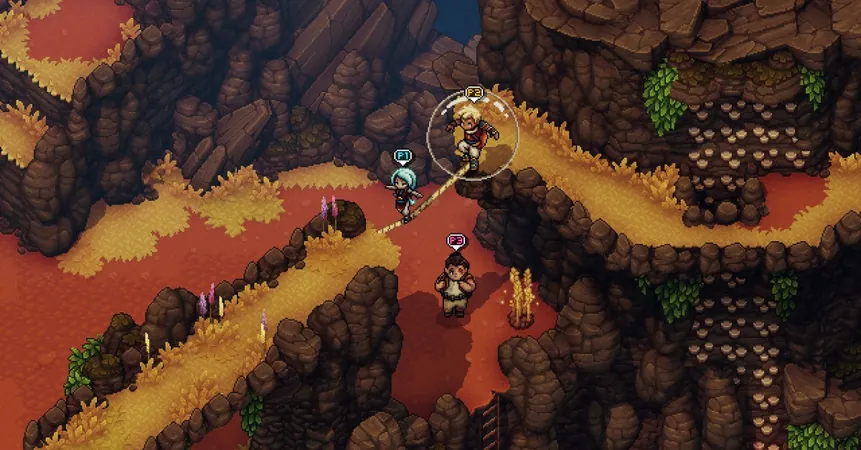
Rediscovering Turn-Based RPGs: How *Sea of Stars* Local Co-Op Breathed New Life into My Gaming Passion
2025-01-14
Author: Jacob
Rediscovering Turn-Based RPGs
When I first heard about the local co-op feature in Sabotage Studio’s *Sea of Stars*, I was hesitant. The thought of a turn-based game, known for its slower pace, being played cooperatively seemed daunting. How could the traditional mechanics of turn-based gameplay translate into a shared experience? Yet, after spending the holidays battling side by side with my little brother, I discovered that this mode was precisely what I needed to reignite my love for turn-based RPGs.
Innovative Mechanics of *Sea of Stars*
What sets *Sea of Stars* apart is its innovative fusion of real-time mechanics within standard turn-based gameplay. Battles progress character by character - a hallmark of the genre - but players can amplify a character's damage and defense with well-timed button presses. For example, tapping the A button just before an enemy attacks can minimize damage, while timing your own strikes effectively boosts your attack power. This blend of timing and strategy offers an exhilarating twist to traditional combat.
Dynamic Co-Op Experience
In co-op mode, this timing system becomes even more dynamic. The game accounts for both players' inputs, meaning that if either player executes a perfect timing, they both reap the rewards. This is a game-changer for tricky attack sequences and timing mini-games, where coordinating efforts can turn a tough battle into a manageable one. The experience of supporting each other while struggling to synchronize our actions made the gameplay not only challenging but incredibly rewarding.
Shared Mechanics and Exploration
Beyond combat, *Sea of Stars* offers a variety of delightful shared mechanics that enhance exploration. The game employs a top-down perspective that is spacious enough to accommodate multiple players, allowing for simultaneous exploration and item gathering. The whimsical element of high-fiving for speed boosts adds a fun layer to traversal. Even mundane tasks, like progressing through dialogue, are shared experiences, fostering interaction and collaboration as the game alternates control of text boxes between players.
The Joy of Cooperation
Playing with my brother allowed us to develop a rhythm that renewed our cooperative spirit. Each challenging boss battle became less intimidating as we strategized together, bouncing ideas off one another. When faced with a tough equipment choice or resource management decision, having a second opinion was invaluable. Instead of feeling stuck or resorting to online guides, we engaged in discussions like, "What should our next move be?" This collaboration redefined my gaming experience, reminding me of the joy of shared adventures.
Nostalgia of Shared Gaming
For me, turn-based RPGs have always represented a collective journey. Fond memories of playing *Pokémon Silver* and *Pokémon Sapphire* come rushing back, where my brother and I would huddle over a small screen, trading the device back and forth. Our later competitive sessions in Pokémon games were thrilling but fleeting. With *Sea of Stars*, we returned to those cherished moments of camaraderie, finally teaming up instead of competing for the Game Boy.
Conclusion
In conclusion, *Sea of Stars* not only revitalized my appreciation for turn-based RPGs but also highlighted the magic of cooperative play. If you’re looking to rediscover the genre or share a nostalgic experience with a friend, this game is highly recommended. Dive into its enchanting world, and prepare to forge unforgettable memories as you conquer challenges together!



 Brasil (PT)
Brasil (PT)
 Canada (EN)
Canada (EN)
 Chile (ES)
Chile (ES)
 Česko (CS)
Česko (CS)
 대한민국 (KO)
대한민국 (KO)
 España (ES)
España (ES)
 France (FR)
France (FR)
 Hong Kong (EN)
Hong Kong (EN)
 Italia (IT)
Italia (IT)
 日本 (JA)
日本 (JA)
 Magyarország (HU)
Magyarország (HU)
 Norge (NO)
Norge (NO)
 Polska (PL)
Polska (PL)
 Schweiz (DE)
Schweiz (DE)
 Singapore (EN)
Singapore (EN)
 Sverige (SV)
Sverige (SV)
 Suomi (FI)
Suomi (FI)
 Türkiye (TR)
Türkiye (TR)
 الإمارات العربية المتحدة (AR)
الإمارات العربية المتحدة (AR)